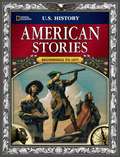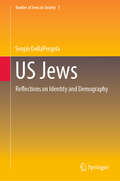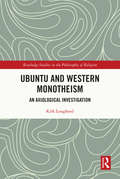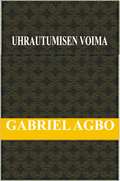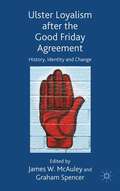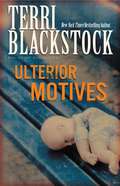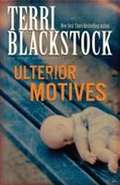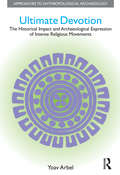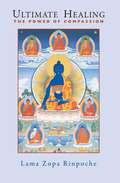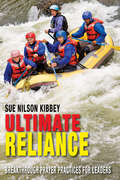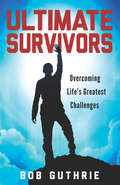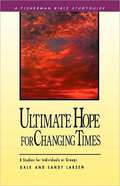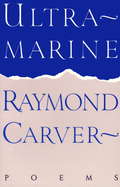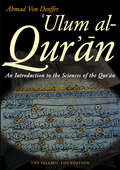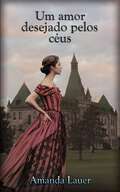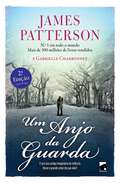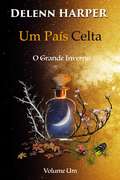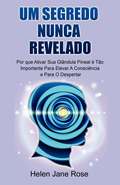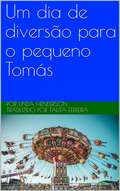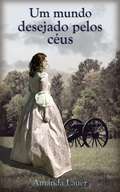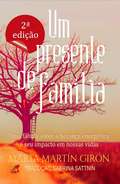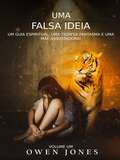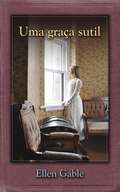- Table View
- List View
US History: American Stories, Beginnings to 1877
by National Geographic StaffThe history of the United States is a chronicle of different regions that today are pulled together on a cultural basis. In the early years, our identity as a nation was defined on a military or political basis-- and we're still struggling with those differences.
US Jews: Reflections on Identity and Demography (Studies of Jews in Society #7)
by Sergio DellaPergolaThis book offers an original and unprecedented in-depth analysis of the demography and identity American Jewry. It discusses crucially important issues for the understanding of the contemporary status, with an adequate historical background – which often lacks in much research work. The volume consists of both brand new chapters and partly relies on several scholarly works in the field that were published over the course of more than 40 years have been revised, updated, split and merged so to form newly conceived content. This text provides a critical and unique approach to the major scholarly trends in American Jewish demography and sociology. It is divided into a number of parts, dealing with population trends, Jewish identification patterns, and yet more specific groups or sub-populations. Each section is preceded by a short introduction. A post-script provides a serious debate about the future of US Jewry and its position and role among World Jewry. This volume appeals to students and researchers working in Jewish Studies.
Ubuntu and Western Monotheism: An Axiological Investigation (Routledge Studies in the Philosophy of Religion)
by Kirk LougheedThis book offers a unique comparative study of ubuntu, a dominant ethical theory in African philosophy, and western monotheism. It is the first book to bring ubuntu to bear on the axiology of theism debate in contemporary analytic philosophy of religion. A large motivating force behind this book is to explore the extent to which there is intersubjective ethical agreement and disagreement between ubuntu and Western worldviews like monotheism and naturalism. First, the author assesses the various arguments for anti-theism and pro-theism on the assumption that ubuntu is true. Ubuntu’s communitarian focus might be so different from the Western tradition that it completely changes how we evaluate theism and atheism. Second, the author assesses the advantages and disadvantages of the truth of ubuntu for the world. Third and finally, he assesses the axiological status of faith for both monotheism and ubuntu. Ubuntu and Western Monotheism will be of interest to scholars and advanced students specializing in philosophy of religion, African religion and philosophy, and religious ethics.
Uhrautumisen Voima
by Gabriel AgboUhrautumiset ovat tehokkaita. Erittäin tehokkaita! Rikkain mies, vahvin mies, kaikkein siunatuimmat miehet ja naiset, viisaimmat, mahtavin kuningas, kaikkein vaikutusvaltaisimmat profeetat olivat uhrautuvia miehiä ja naisia. He antoivat kaiken, riskeerasivat kaiken kansansa vuoksi, inhimillisyyden ja Jumalan vuoksi saavuttaakseen tavoitteensa ja urotyönsä, josta jopa ikuisuus olisi ylpeä. Jos haluat tulla mahtavaksi, sinun täytyy ensin tulla uhrautuvaksi mieheksi/naiseksi. Kaikki on mahdollista niille, jotka pystyvät maksamaan hinnan. Tulet huomaamaan näiden hyvin paljastavien lukujen - Uhrautumisen Voima, Uhraa Vain Omasi, Kuljen Egyptin Kautta, Maksan Hinnan, Seuraa Minua! Tulimme Sinun Vuoksi, Minä suojelen Sinua, Keitä Viimeinen Ateria, Pelastamisen Voima, Ylistäminen, Rukous ja Paasto. Emme ole vain keskustelleet Raamatun suurten miesten ja naisten uhrauksista ja kuinka heidän tekonsa tekivät heistä suuria, vaan myös sellaisista ihmisistä kuin Israelin 'Yoni' Netanyahu; nuori israelilainen, joka johti kommandoyksikköä pelastamaan juutalaiset panttivangit, joita pidettiin Entebben lentokentällä heidän koneensa tultua kaapatuksi ja ohjatuksi Ugandaan vuonna 1976. Katselimme myös joitakin meidän sotasankareita, erityisesti Erikoisjoukkojen - kuten SEAL, Delta -yksikkö. Nämä miehet antoivat kaikkensa, riskeerasivat jatkuvasti kaiken, myös elämänsä puolustaakseen kansaansa ja inhimillisyyttä. He uhrasivat elämänsä suojellakseen muita. Jeesus sanoi, että suurin uhraus ihmiselle on, että antaa oman henkensä toisten vuoksi. Me osoitamme kunnioituksemme heille. He opettavat meille mitä uhrautumisen pitäisi olla. Jeesus kertoi, että mikä uhraus on suurempi kuin mies, joka antaa henkensä ystäviensä vuoksi? Me ylistämme heidän rohkeuttaan ja äärimmäistä isänmaallisuutta. Tässä, me opimme uskon uhrauksista, ystävällisyydestä, isänmaallisuudesta, rukouksesta, paastoamisesta ja ylistämisest�
Ulster Loyalism after the Good Friday Agreement
by Graham Spencer James W. McauleyA timely assessment of loyalist history, identity and community in Northern Ireland today which provides a comprehensive picture of how loyalism has reacted to changes since the Good Friday Agreement. Challenging simplistic stereotypes of loyalism this book provides a complex multi-faceted explanation of the loyalist imagination.
Ulterior Motives
by Terri BlackstockThe police think he killed someone. He swears he’s innocent. All she knows for certain is his crime against her. Louis Dubose, international art dealer, has been murdered. The police are certain they’ve got their man. Recently fired by Dubose, Ben Robinson has a motive backed by a convincing trail of evidence. Except that one person isn’t convinced—someone who knows Ben well. Knows that he’s quite capable of trashing human lives but not of taking them. Now that person is about to gamble her own well-being on his innocence . . . when her personal indictment against him may be almost as bitter as murder. The question is, does Sharon Robinson know Ben as well as she thinks she does? Two small kidnapping victims hold the answer—and time to save their lives is running out. Ulterior Motives is more than just a superbly crafted suspense novel. It’s a wrenching portrayal of the cost of forgiveness, of innocence and faith pitted against monstrous evil, and of skepticism’s journey to the cross of Christ. Ulterior Motives is book three in the Sun Coast Chronicles by award-winning author Terri Blackstock. From absorbing legal drama to lightning-paced action, the Sun Coast
Ulterior Motives (Sun Coast Chronicles #3)
by Terri Blackstock#3 in her Sun Coast Chronicles Series.
Ultimate Devotion: The Historical Impact and Archaeological Expression of Intense Religious Movements (Approaches to Anthropological Archaeology)
by Yoav ArbelFrom the first Jewish revolt against Rome in the first century CE to contemporary Islamic fanaticism, faith in the hands of religious zealots has been a powerful and often catastrophic means of enacting radical change. 'Ultimate Devotion' examines a range of religious movements across history to reveal the striking similarities in the way they emerged, the characters of their leaders and followers, and their often tragic conclusions. A rich variety of archaeological materials intersect with textual evidence and anthropological theory to develop a model of mass action inspired by intense religion. In its exploration of religious rebellion in history, 'Ultimate Devotion' illuminates religious fanaticism today.
Ultimate Healing
by Lama Thubten Zopa Rinpoche Ailsa Cameron Lillian TooWe experience illness on a physical level, but in order to be healed, we must understand where true healing begins: within our hearts and minds. In Ultimate Healing, internationally renowned meditation master Lama Zopa Rinpoche helps us to recognize the root of illness and gives us the tools to create our future happiness. Beginning with stories of people who have recovered from disease through meditation, Rinpoche addresses the central role played by karma and by the mental habit of "labeling" in causing illness, and shows how meditation and other thought techniques for developing compassion and insight can eliminate the ultimate cause of all disease. Ultimate Healing shows us that by transforming our minds, especially through the development of compassion, we can eliminate the ultimate cause of all disease. In addition to relating stories of people who have recovered from disease through meditation, Lama Zopa presents practical healing meditations, including white-light healing, compassion meditation, "taking and giving", and techniques to cure depression.
Ultimate Reliance: Breakthrough Prayer Practices for Leaders
by Sue Nilson KibbeyAdding a Breakthrough Prayer Initiative to the teamwork of your churchor ministry’s leadership will change everything—and transform what mayhave become routine administrative work, into riding the exciting rapidsof a God-led spiritual adventure together!Author Sue Nilson Kibbey’s classic church leadership book, Ultimately Responsible, and her most recent release Flood Gates: Holy Momentum for a Fearless Church,are followed by this new resource that will strengthen the "flood gate"of your breakthrough prayer practices both collectively andindividually. Each chapter includes discussion questions, applicationideas, a breakthrough prayer practice for the week or month—plus a shortinspirational video story of a leader like you whose breakthroughprayer practice made all the difference. (Downloadable videos storiespackage or DVD sold separately). Ideal for use with your churchcouncil, board, leadership team, class, small group or entirecongregation—whoever longs to build prayer practices for breakthroughsand new God possibilities as the ultimate foundation for everythingelse.
Ultimate Survivors
by Bob GuthrieWhether we are aware of it or not, there is a challenge lodged in the very core of our being. Our response determines how well we handle trials, and whether or not we find true satisfaction. Author Bob Guthrie revisits many of Jesus&’ teachings that have been overlooked, ignored, or misinterpreted to increase your understanding of God and His Word. Ultimate Survivors provides the wisdom you need to rise to the challenge and confront the issues keeping you from the best in life.Are you ready to overcome your greatest trials? Will you embrace God&’s process of restoration, confident that His is the best plan for your life? Ultimate Survivors will inspire you to accept the challenge and become all that God created you to be.
Ultimate hope for Changing Times: 8 Studies for Individuals or Groups (Fisherman Bible Studyguide Series)
by Sandy Larsen Dale LarsenNone of us knows what the future holds. But in the midst of our uncertainty, God offers us real hope, a confidence in the certainty of who he is. This guide looks at the Christian's daily and eternal hope in Christ, reminding us that no matter how bad or good things are now, something far more awesome is on the way for God's people. Book jacket.
Ultramarine: Poems (Vintage Contemporaries)
by Raymond CarverOne of Raymond Carver&’s final collections of poetry, moving from the beauty of the natural world to thoughts of mortality and family and art. Throughout, Carver &“has the astonished, chastened voice of a person who has survived a wreck, as surprised that he had a life before it as that he has one afterward, willing to remember both sides&” (The New York Times Book Review).
Ulum al Qur'an
by Ahmad Von DenfferThis classic and popular introduction to the sciences developed to interpret and understand Islam's holy book is ideal for all serious students of the Koran. Precise, yet comprehensive, it covers the traditional disciplines, including the meaning and contexts of revelation, the history and transmission of the text, and exegesis, as well as more contemporary topics like the recording of the Koran, the history of Orientalist approaches, and a survey of translations. It ends with a guide for the correct recitation of, and etiquette toward, the Koran.Chapter 1: The Qur'an and RevelationChapter 2: Transmission of the Qur'anic RevelationChapter 3: The Qur'an in Manuscript and PrintChapter 4: Form, Language and StyleChapter 5: Understanding the TextChapter 6: Interpreting the TextChapter 7: Some Related IssuesChapter 8: Reading and Studying the Qur'anAhmad Von Denffer was born in Germany in 1949. He studied Islamics and Social Anthropology at the Universty of Mainz, where he also attended additional courses in the Department of Missiology. His special interests include Christian-Muslim relations. He has made a number of contributions to scholarly journals and has several publications to his credit. He joined the Islamic Foundation as Research Fellow in 1978 and is presently working with the Islamic Centre, Munich.
Um Amor Desejado Pelos Céus: Série Desejado Pelos Céus (3 #3)
by Amanda LauerEm "Um Amor Desejado Pelos Céus", a emergente socialite da Guerra Civil Josephine Bigelow é inspirada pelas palavras de Louisa May Alcott para fazer um nome para si mesma como uma escritora investigativa cobrindo a situação dos soldados confederados mantidos em prisões federais. Mal sabia ela que um dos prisioneiros confederados que iria encontrar era o colega de quarto de seu irmão da Academia Militar de West Point, o seu primeiro amor. Embora seu pai seja um general-de-brigada da União, a paixão de Josephine pelo belo soldado confederado Michael McKirnan reacende-se. Por mais cativante que Josephine seja, a última coisa que Michael precisa é se envolver aquela bela jovem em sua vida de intrigas. A obstinada Josephine não será dissuadida e suas vidas se entrelaçam enquanto eles embarcam na jornada de suas vidas, tentando ficar um passo à frente dos militares e de um louco decidido a se vingar. Enquanto eles viajam de Washington, DC, para St. Louis, Atlanta e, finalmente, East Texas, os dois descobrem o que o amor, a fé, a compaixão e a lealdade realmente significam.
Um Anjo da Guarda
by James PattersonE se o seu amigo imaginário de infância fosse o grande amor da sua vida? Uma gatinha frágil e faminta é resgatada das ruas de Nova Deli por Sua Santidade, o Dalai Lama, e torna-se a companheira preferida do líder espiritual tibetano. Esta é a sua história, contada na primeira pessoa, pela própria gata. Na nova casa, um mosteiro com vista deslumbrante sobre os picos nevados dos Himalaias, a gata do Dalai Lama testemunha encontros com estrelas de Hollywood, mestres budistas, professores de universidades de topo, filantropos e muitas outras pessoas que procuram os conselhos do seu dono. São estas as histórias que a gatinha nos conta, de modo divertido, irreverente e sábio, proporcionando ensinamentos sobre como encontrar a felicidade e o significado da vida num mundo tão intenso e materialista.
Um Papai para o Natal: O Natal de um Veterano
by Rachelle AyalaKelly Kennedy, mãe solteira, não pode pagar presentes luxuosos para sua filha de quatro anos, Bree. Tyler Manning, um veterano sem-teto, não acredita que ele merece um Feliz Natal. Quando Bree pede um pai ao Papai Noel e escolhe Tyler, Tyler e Kelly prometem não deixar que Bree se machuque enquanto eles lutam contra os sentimentos que estão sentindo um pelo outro. Tyler sofre com flashbacks aterrorizantes que assustam Kelly. Enquanto isso, o passado criminoso de Kelly ameaça sua chance de felicidade. Tyler e Kelly devem acreditar no poder do amor para dar a Bree o melhor Natal de todos.
Um País Celta: O Grande Inverno
by Delenn HarperNum mundo onde os celtas não perderam para os romanos, hoje em dia e bem escondidos, ainda há druidas e as suas escolas na Europa. Em Paris, Lania, 27 anos, está perdida na vida, com medo dos homens e da sociedade. Ela observa a sua vida de rapariga da cidade perguntando-se para onde terão ido os seus sonhos de infância e a magia que a rodeia. Mas Avalonia, a escola das Sacerdotisas de Avalon, não se tinha esquecido disso. Ela decidiu seguir esta espiritualidade feminina onde pensava estudar o Universo e os seus mistérios, mas onde curaria feridas muito mais profundas. Para ela, é agora que tudo começa. A sua vida será transformada por esta viagem, no coração da Europa, no fim do mundo. Neste conto iniciático moderno, com três volumes que mudam como as estações do ano, seguem as peregrinações de uma jovem parisiense à medida que aprende sobre a feminilidade sagrada...
Um Rafeiro de Natal
by Rachelle Ayala Vera Cristina NevesJuliette Martin não quer mais comemorar o Natal novamente, não quando isso significa reviver o último depois que seu filho de seis anos, Jeremiah, faleceu na véspera de Natal. Ela e seu marido, Gabe, encontram-se presos numa cabana na montanha com um par de sem abrigo. Juliette precisa desesperadamente de um milagre para salvar seu casamento e restaurar sua fé em Deus. Um cão vadio e um menino órfão podem ajudá-la a acreditar na magia do Natal e no poder do amor?
Um Segredo Nunca Revelado - Por que Ativar Sua Glândula Pineal é Tão Importante Para Elevar A Consciência e Para O Despertar
by Helen Jane Rose Jorge Frigola PardoDentro das páginas deste livro encontra-se um segredo que nunca foi revelado - sua Glândula Pineal funciona contra você, a menos que tenha sido totalmente ativada. Um Segredo Nunca Revelado é um apelo à ação. É um livro canalizado a partir das comunicações da Colaboração da Consciência Iluminada que foi escrito através da técnica de escrita automática. Mais do que apenas palavras, o livro oferece uma ativação de energia - a ativação do Glândula Pineal. O livro possui códigos e freqüências energéticas dentro de suas palavras que não estão vinculados pelo tempo e espaço. Você foi chamado para abandonar a consciência de massa e incorporar a consciência da alma, o lugar dentro de você que conhece o amor, a compaixão e a aceitação incondicionais. Tempo para fazer a paz com todos vocês ... o passado, a programação e as falsas crenças sobre você. Este livro é uma ferramenta de capacitação para a Nova Terra.
Um dia de diversão para o pequeno Tomás
by Linda HendersonUm dia de diversão para o pequeno Tomás por Linda Henderson Além de treinar matemática, Tomás aprende como tratar as pessoas de maneira igual no parque de exposições. Um parque de exposições pode trazer experiências muito interessantes aos jovens assim como aos jovens de coração. Tomás adorou tudo, especialmente os brinquedos e os animais, além disso, gostou muito de fazer contas de cabeça. Isso tudo o fez descobrir que havia muitas coisas a aprender na exposição. Enquanto ouvia seu tio Aldo somava o preço dos ingressos, compartilhou uma lição de vida na qual Tomás aprendeu como é importante tratar as pessoas de maneira justa e igual. Nós todos também podemos aprender com o que o tio Aldo disse ao Tomás. Neste livro de leitura fácil para idades de 6 a 8 anos, as crianças podem se divertir com Tomás e sua família enquanto caminham pelos jardins do parque de exposições, podem fazer contas de cabeça e praticar matemática. E no final do livro, as crianças são apresentadas ao mais justo de todos os tempos! Gênero: JUVENIL / Matemática / Geral Gênero Secundário: JUVENIL NÃO FICÇÃO / Religioso / Cristão / Família e Relacionamentos Língua: Português BR Palavras-chave: Parque de Exposições, diversão, matemática, igualdade, soma, adição, família Contagem de palavra: 1115 Links para livros: Amazon
Um mundo desejado pelos céus (Desejado pelos Céus #1)
by Amanda LauerVencedor do Catholic Arts and Letters Awards em 2016! Amara McKirnan e Nathan Simmons são católicos devotos, mas suas lealdades são de lados opostos na Guerra Civil Americana. Apoiando a causa dos Confederados, Amara se oferece para ajudar no hospital provisório do tio em Atlanta. O destino traz Nathan à porta deles e para a vida de Amara. O que ela não sabia era que o soldado ferido que cuidou esconde um segredo que, não vai somente pôr em perigo a própria vida, mas como também a de Amara. De uma Atlanta devastada pela guerra, passando pelos campos de guerra ao norte da Georgia até as planícies do leste do Texas, as vidas dos dois se tornam entrelaçadas de tal forma que se chocam com os mundos separados que viviam.
Um presente de família
by Marta GirónEm muitas ocasiões nos acontecem coisas que não sabemos explicar, situações que nos causam dor porque não conseguimos compreendê-las. Muitas vezes, chegamos a colocar a culpa da nossa infelicidade no destino. Mas, o quê aconteceria se tudo não passasse de um "presente" que fosse transmitido de geração a geração para curar alguém além de nossos ancestrais? O quê aconteceria se tudo não passasse de fruto de experiências passadas, de nossa memória transgeracional? O quê aconteceria se as dores físicas trouxessem uma mensagem passível de decodificação? Ou se nos tornássemos conscientes de todas essas experiências e nos curássemos? Nos sentiríamos livres? Recuperaríamos nossa saúde? Retomaríamos nosso caminho com novos objetivos? Este livro está baseado em uma história real, nas experiências da própria autora e circunstâncias da sua vida que ela não conseguia entender, mas sabia que não eram fortuitas. Aqui, será possível acompanhar seus avanços num caminho nunca antes imaginado. Un caminho condicionado pelas influências dos padrões herdados da energia ancestral de seu clã.
Uma Falsa Ideia: Um guia espiritual, uma tigresa fantasma e uma mãe assustadora! (A Série Megan Psíquica #1)
by Owen Jones“O Mal-entendido” é a primeira história de uma série de vinte e três romances curtos sobre o desenvolvimento espiritual de uma jovem chamada Megan. Ela possui poderes sobrenaturais latentes que a deixam curiosa sobre eles, mas ninguém mais que ela conhece parece ter qualquer ideia sobre o que ela tem a contar a respeito. Mas... Ninguém mais? Porque tanto sua avó e sua mãe fazem tudo o que podem para impedir que Megan descubra mais sobre isso. A história mostra a frustração de Megan com os que estão vivos e, então, quando a ajuda vem do Além, ela a recebe de braços abertos e desenvolve lentamente seus poderes sobrenaturais. A história é sobre um despertar, o despertar de Megan. "O mal-entendido" é sobre os poderes paranormais que estão dentro de todos nós, o que nos tornaria não tão paranormais e, sim, bastante normais, se as pessoas não tivessem tanto medo do sobrenatural, algo que é bastante comum. Este é um livro para todos que já se perguntaram sobre o sobrenatural, o paranormal ou o metafísico - trata-se do desenvolvimento normal e espiritual que toda a vida superior tem que atravessar para chegar ao seu destino final e inevitável, seja qual for o tempo que demore. Essas histórias estão baseadas, de fato, em vários significados.
Uma Graça Sutil
by Ellen GableFiladélfia, 1896. Na sequência de “Apenas por nome”, “Uma graça sutil” continua a rica e pouco convencional família O’Donovan enquanto eles se aproximam do nascimento de um novo século. Aos 19 anos, Kathleen (a filha mais velha) ainda está solteira e sem pretendentes. Temendo virar solteirona, sua impaciência faz com que ela acabe se apaixonando pelo primeiro homem que se interessou, o filho gentil e belo do chefe de polícia local. Mas será que sua impulsividade vai impedi-la de conhecer seu verdadeiro amor? Eventos perturbadores trazem uma nuvem negra para sua vida, que ameaça a vida feliz que ela tanto deseja ter. Dr. Luke Peterson, novo médico da família, também causou uma boa impressão em Kathleen. Sua afeição por ela faz com que ele tenha revelações surpreendentes: sobre Kathleen, sobre seu trabalho e, mais importante, sobre si mesmo. Will, o filho mais velho, acredita Deus deseja que ele siga a vocação religiosa. Eventualmente, porém, ele descobre um segredo sobre seu passado que faz com que embarque em uma peregrinação a Roma. Embora “Uma graça sutil” seja continuação de “Apenas por nome”, cada livro pode ser lido de forma independente um do outro.
